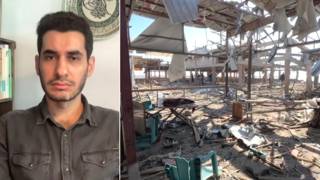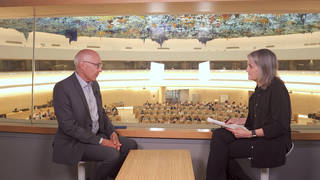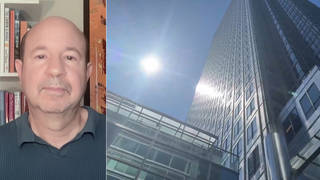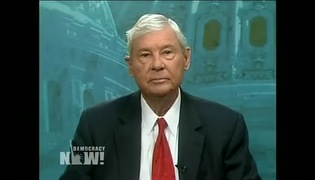
Topics
Guests
- Robert GreenwaldFounder and president of Brave New Films. He is a producer, director and activist, and his latest film is called Rethink Afghanistan premiering in New York tonight.
As the eighth anniversary of the US-led bombing of Afghanistan draws closer, the Obama administration continues to debate the best way to fight this ongoing war. Senate Democrats voted Thursday to delay a congressional briefing by General Stanley McChrystal, the top US commander in Afghanistan. Meanwhile, a NATO air strike on a compound in southern Afghanistan has reportedly killed a family of six. As the civilian death toll in Afghanistan continues to rise, we turn now to an excerpt from a new documentary by filmmaker Robert Greenwald of Brave New Films. It’s called Rethink Afghanistan and premieres today in New York. [includes rush transcript]
Transcript
JUAN GONZALEZ: As the eighth anniversary of the US-led bombing of Afghanistan draws closer, the Obama administration continues to debate the best way to fight this ongoing war. Senate Democrats voted Thursday to delay a congressional briefing by General Stanley McChrystal, the top US commander in Afghanistan.
Speaking in London hours before the vote, McChrystal warned that insurgents were gaining strength and could wreck the NATO mission unless additional troops are sent. Last week, the General reportedly made a secret request to the Pentagon for more US troops. That number could run as high as 40,000, according to some reports.
AMY GOODMAN: Well, not everyone in Congress thinks the US presence in Afghanistan should be expanded. Wisconsin Democratic Senator Russ Feingold, speaking on the Senate floor Thursday, warned against sending any more troops to Afghanistan and called for a flexible timetable to withdraw troops.
SEN. RUSS FEINGOLD: Rather than looking desperately for a quick fix to the problems that plague that country, we must acknowledge the limits, Mr. President, the limits of our ability to radically remake Afghan society, no matter how many billions of dollars and tens of thousands of troops we may commit to the cause. Instead, we should pursue a sustainable, a civilian-focused strategy to support the emergence of legitimate governance. Mr. President, this is the surest way to defeat the Taliban in the long term.
I don’t think this makes sense, Mr. President. Occupying the population centers of southern Afghanistan is likely to provoke a greater resentment and increase the danger to our troops and to the Afghan public. A majority of Afghans oppose an increase in foreign troops and want to see foreign troops leave the country within two years. Without giving the American and Afghan people a sense that our military operations will not go on indefinitely, I think we’re likely — unlikely to gain the support needed to accomplish our goals, particularly if we know going in that civilian casualties will only increase in the short term.
JUAN GONZALEZ: Meanwhile, a NATO air strike on a compound in southern Afghanistan has reportedly killed a family of six. As the civilian death toll in Afghanistan continues to rise, we now turn to an excerpt from a new documentary film by filmmaker Robert Greenwald of Brave New Films. It’s called Rethink Afghanistan and premieres today in New York.
ORZALA ASHRAF: What would you expect from those children who lost their feet or their arm or their mother or their father during that kind of bombing? What would you expect from them? Do you expect them to join the peace process? Do you expect them to say, “I have excused you”?
UNIDENTIFIED: Unfortunately, a battlefield is a very messy place, and it’s very hard to tell people from each other.
COL. GREG JULIAN: The air strike was a precision munitions fired from the air, outside of the — away from the civilian population, on two individuals that were firing on the coalition forces. So it wasn’t on the homes or in the area where it would put civilians at risk.
BBC NEWS: Local residents have said the attacks killed nearly 150 people. The US military says such figures are grossly exaggerated, and further air strikes against the Taliban have not been ruled out by the Obama administration.
SONALI KOLHATKAR: Afghans see this around them. They understand. They know. They see the bombing. And on the one hand, they’re being told that they’re — the US is there to liberate them from the Taliban and to defeat the Taliban; on the other hand, they have these bombs dropping and killing them and their fellow villagers.
ERICA GASTON: I think when you go in and you talk to most families who have been affected by an incident or those in a community who have seen their neighbor killed or injured, what they’ll say to me is, you know, “They came in, and they promised us that they would bring peace and they would help us. And now look. All they’re doing is killing innocent civilians.”
AIR RAID VICTIM: [translated] This was the room where we were sleeping. We were sleeping in this room. This was one room. And there, one bomb fell over here, right there, and the other one right there. There was the hallway and the veranda. There was a kitchen, a bathroom and a guest room. There was a water well. Everything was destroyed.
DISPLACED CIVILIAN: [translated] I swear that our village consists of approximately 2,000 or 2,500 houses, but there are only a couple left. Whether our houses or our fields, they are all ruined.
DISPLACED CIVILIAN: [translated] We have those who have been wounded, lost their legs, those who have lost their arms, those who have been killed. This has happened. There are battles, bombings. Houses have collapsed on us. When the Taliban fires from here, then there is a bomb dropped here. These are children. They can’t be detected that they are here. The Taliban are already gone, but the children are playing in the dirt.
AFGHAN CIVILIAN: [translated] They bombard villages, mosques. Why don’t you recognize the innocent children, communities and places? In Deh Rahwod province of Urozgan, weren’t the fleshes of me, women, children, cows, dogs and animals mixed together?
AIR RAID VICTIM: [translated] The airplanes came in bombarded us. I have five orphans. My husband got killed. My daughter-in-law was killed. All these kids are left for me, and I am sick. They’re hungry, they’re thirsty, and I don’t know what to do with them. We don’t have anybody to help us.
DISPLACED CIVILIAN: [translated] We were in Helmand. We had a job. We were doing the farming, and we were growing poppies. For example, someone was a farmer, and we had our land, we had our crops. Also, we had money. Everything was OK back home.
DISPLACED CIVILIAN: [translated] If it wasn’t for the war, I would want to go back. If there was freedom, I want to go back. Why am I here? Now there is war and bombardment, and I can’t go back. Before, I was a farmer, but I can’t go back. I was growing wheat and poppy and corn, melons. I was taking care of the children. But right now I can’t do anything. Look, they are barefoot in this cold weather. I don’t have anything. I am very poor. They are standing in the water barefoot. I am scared they will die. Then what can I do? One of my daughters is dead. She died, and they will die, too. This child, I can sell her, but nobody will buy her. What can I do? I can sell her, but nobody wants her. What can I do? For God’s sake, I want to sell this child, but nobody wants her. What can I do? I have nothing. I am poor. I don’t have any blankets, I don’t have any shawls, I don’t have any clothes. There is no food that I can put in her mouth. For God’s sake, I am poor. Otherwise, I wouldn’t give her for one million. I know nobody wants to sell their daughter, but I have to. She is innocent, but I am poor. I have nothing.
AFGHAN CIVILIAN: [translated] We tell them that in our country, we are dying from bombardment. Here we die from hunger and cold.
AIR RAID VICTIM: [translated] I have this message for Obama, that he takes his troops out of Afghanistan. They’re going to leave anyway. It’s better for them to leave Afghanistan on their own terms now rather than later, to leave our country voluntarily. We’re all deformed. People are missing fingers. Look at my finger. Some people are missing eyes, some people are missing legs. Some are missing their arms. They destroyed the whole nation.
AMY GOODMAN: An excerpt from the new documentary from Brave New Films called Rethink Afghanistan, premiering tonight in New York. Robert Greenwald is the director of the film and founder and president of Brave New Films. He joins us now in our firehouse studio.
Robert, welcome to Democracy Now! It’s not just the premiere of a film in New York. You have been debuting this online. This is a media activist campaign that you’re engaging in, as we move in on this — it’s hard to believe — eighth anniversary, eight years since the US invasion of Afghanistan.
ROBERT GREENWALD: Yeah, we started in January, and we put out a section at a time, as soon as we could finish it, as soon as we could fundraise, so that people could use it. And each section has a different theme: troops, women, civilian casualties, cost of war and security. Now we’ve put them all together into a finished film.
And there are hundreds, and soon thousands, of house parties across the country, where people are going to the Rethink Afghanistan website, ordering the DVD, and then bringing people together, asking the questions. And maybe most importantly, we’re encouraging people to have members of the House of Representatives come in the district and show sections of the film and then have a critical discussion about the reasons and why we’re in this war and what we can do to stop it.
JUAN GONZALEZ: Well, your approach is significantly different from other filmmakers. We had, last week, Michael Moore on here on his new film. And, of course, he zealously guards any copies of his film, doesn’t want any of it to get out to the internet until it actually premieres. Why this approach of releasing it as you’re making it?
ROBERT GREENWALD: Well, there was a couple of reasons here, and it’s consistent with what we’ve done with the other films and with the online campaign, “Sick for Profit,” which is, our mission is to reach as many people as possible and to motivate them to take action. And there’s no question, the way to do that is using this incredible technology that the internet has given us. It’s essentially taken down the gatekeepers, so there’s nothing stopping us from reaching millions of people.
With Afghanistan, the decision is being made now. And we really believe there’s a chance to truly affect this decision in a way that we’ve never had before, because it’s not an ideological war. And if we can reach people, if we can activate them, and if we can educate them — and that means members of the Senate, members of the House, communications directors, chiefs of staff. They have such profound unease about this war and so little information. When I got back from Afghanistan, you know, I was besieged with people calling and asking and wanting to know more.
AMY GOODMAN: The response to taking on the Obama administration? You’ve been doing this now — I mean, this has been in the works for a while.
ROBERT GREENWALD: Yes, we’ve been working on it since January, and when we first started asking these basic questions, which was — you know, it’s — “rethink” is the frame. And the questions are, how many troops? What’s the cost? How long? What’s an exit strategy? Simple, basic questions.
We were pretty strongly attacked by allies and what we thought were friends and colleagues and lost some major funding over it, because people felt that we were — we shouldn’t be asking these questions; we should just be marching in lockstep with anything that the administration wants.
Well, now, of course, the ground has shifted, and it’s critical that people speak up, because the military is putting enormous pressure. I mean, McChrystal is going around the world, basically, asking for people to support the troop escalation. They’re leaking the reports and things like that. So I think there’s a real opportunity, given that the administration now seems to be asking questions, to push back and to reach senators and reach members of the House.
JUAN GONZALEZ: And, of course, there appear to be huge differences within the administration. You’ve got Vice President Joe Biden being very outspoken —-
ROBERT GREENWALD: Mm-hmm.
JUAN GONZALEZ: —- about his views on Afghanistan. And you’ve got General David Petraeus, who’s in charge of the overall war effort in Iraq and Afghanistan, not yet endorsing General McChrystal’s call for more troops. So there seems to be a lot of fluidity and debate going on among key people in the Obama administration, as well.
ROBERT GREENWALD: Yeah. Well, I think it’s actually very encouraging. And not to be naive about it, but I believe there’s an opportunity here to stop the military-industrial-think-tank complex in a way that we may have never had before. It’s easy to get into war. It’s hard to get out. The more troops we put in, the harder it is. But now is a really pivotal moment. And if people, I think, speak up really loud and clear — and I can tell you, speaking to elected officials and their chiefs of staff, there’s such a concern and anxiety. They don’t want to be pulled into this, and yet they don’t know what to do.
AMY GOODMAN: Robert Greenwald, I want to turn to another clip of your film. This is about the costs of war in Afghanistan to the US taxpayer.
LINDA J. BILMES: In today’s dollars, the amount that we spent per troop in World War II was $50,000. We’re spending ten times that per troop in Iraq. We can expect that the per troop cost in Afghanistan is higher than that. I would expect that it will be between 20 to 50 percent higher cost in up-front cost per troop.
LAWRENCE KORB: Afghanistan is very difficult to supply, and it becomes much more expensive to ferry the stuff either through Pakistan or to come in the other way from Russia and through the Caucasus states.
LINDA J. BILMES: The whole situation in terms of supply routes into Afghanistan is very, very different than it is in Iraq. Now, in Afghanistan, you have a country which is mostly rural, which is mostly mountainous, which is not desert.
LAWRENCE KORB: Afghanistan is completely landlocked. And so, what we’ve had to do is, up until now, we’ve been sending the majority of the supplies — for example, oil — through Pakistan.
WINSLOW WHEELER: We’re opening up this alternate supply route that gets into Afghanistan from the north that requires the cooperation of Tajikistan and several of the other “stans” on the northern border of Afghanistan. It’s much longer and torturous. It’s going to be a more expensive logistics route. So those costs are going to go up in a manner not commensurate with the numerical increase in troops, but above and beyond that.
JO COMERFORD: Right now, the United States, through fiscal year 2009, will have committed and/or spent more than $185 billion on the US war in Afghanistan.
SSG. CHRISTOPHER BENTLEY: I feel like we haven’t done the right thing on our part, you know? We spend so much money over here, but we don’t spend it the right way. You know, we have HESCO barriers shipped in from the United States. We probably pay more on the shipping to get that over here than we could pay local people to build a wall around this base.
AHMED RASHID: These enormous funds that did go out to Afghanistan, but they were given — the money was given to contractors, who subsequently subcontracted and subcontracted. And by the time you get to how much money reaches the ground, maybe 40 or 50 percent of that money actually reached the ground for the projects, because all these subcontractors were taking ten percent off as profit.
ANAND GOPAL: Let me give you an example. The United States recently spent $160 million on building roads and digging wells and this sort of thing in one province here in Afghanistan. But the way that works is they are giving that $160 million to a preferred contractor, who then goes and subcontracts this out to a local Afghan company. And the Afghan company will maybe get ten percent of that. And everything in between is just pocketed by that middle company. So this is a massive amount of waste for American taxpayers.
But also, there’s no oversight for the projects that are actually being constructed. I’ve talked to construction contractors that go and take — who are tasked with the job of building a well, for example, and they’ll go and take a picture of some well out there that they’ve already — that has already been built and show it to the Americans and say, “This is the well that we’ve built.” And they’ll say, “OK, thank you very much. And here’s your money.” There’s no oversight, no accountability. Nothing whatsoever.
SSG. CHRISTOPHER BENTLEY: Those wells, like those handpump wells you see everywhere, how much did you say? That it’s like $700 to $1,000 to build one of those?
US SOLDIER: Mm-hmm. Yeah, to build.
SSG. CHRISTOPHER BENTLEY: We’ve been paying like ten grand per well.
PRATAP CHATTERJEE: The local Afghans from rural communities, when they come to Kabul and they see these international consultants, who drive in Toyota Land Cruisers, who live behind barbed wire and blast walls, who have, you know, highly paid security guards, that are buying — that have swimming pools, that are importing food from America, you know, realizes and gets angry that the money that was supposed to be for them is actually going really to sustaining a Western lifestyle for foreign consultants, as opposed to providing them with sanitation and wheat and, you know, local education.
AMY GOODMAN: That was Pratap Chatterjee of CorpWatch in the new film Rethink Afghanistan. It’s debuting here tonight in New York. It’s by Robert Greenwald, the founder and president of Brave New Films.
Talk about the different sections that we haven’t played and the power of this, as well as people like Colin Powell who visited Obama in the White House.
ROBERT GREENWALD: Well, one of the sections raises the whole question about can troops solve the problem, which, of course, they can’t. Look, Afghanistan is —-
AMY GOODMAN: They “can” or they “can’t”?
ROBERT GREENWALD: They cannot. It’s a deeply troubled country, the third poorest country in the world. And the notion that we can solve militarily what are economic, social problems is absurd, and it’s a fundamental flaw. So we have a whole section with a series of experts talking about the military not solving the problem, in fact making it worse.
We have a whole section to break the myth that somehow the United States went to war in Afghanistan to protect the feminist revolution, with women in Afghanistan, who we interviewed, talking about the fact that they despise the Taliban, but the foreign troops make their life equally bad, and how bad it is under the Karzai government.
And then a section on security, which goes to the fundamental issue, because the only justification for the war is it’s going to make us safer. And we have former CIA experts and other experts saying, no, this is a policy that is possibly even going to make us less safe, which goes to the argument of those who believe in the war.
So, between each of the sections of the film, we try to cover the core spectrum of the questions, with over a hundred people we’ve interviewed and then lots of footage we shot and have shot in Afghanistan.
And the other thing we did, we made a commitment to -— you know, one of the many tragedies with the Iraq war, there were never the face or the voices of the Iraq people. So, in the film, you’ll see constantly that we’re talking and interviewing and having represented the people in Afghanistan, who we’re, quote, “going to save,” but who are not asking us to come in and save them with military means.
JUAN GONZALEZ: And in terms of the security issue, we were — in the discussion we had earlier, before we got — we came on the broadcast, you were talking about how key policymakers are not distinguishing, as you were able to, between the Taliban and al-Qaeda as targets in Afghanistan. Can you talk about that some?
ROBERT GREENWALD: Yeah, it was pretty shocking to me that they’re clearly two different organizations. And when I was there and I met — the day I was leaving, I was interviewing former Taliban who were turning in their guns. And they are a nationalist organization, an organization that has done some terrible things, but a nationalist organization. They’re not an organization about international terrorism. And many of the Taliban despise al-Qaeda.
So the notion that we’ve mixed these two together — and it came out in the paper today and in the review they had yesterday, people from the administration were asking McChrystal this question, who doesn’t seem to differentiate between the two. That’s a tragic, major flaw. And the security experts in the security section talk about that over and over and over again. Al-Qaeda is a small group. They do — you know, terrorist group. How do you get them? Well, do you occupy an entire country to find a few people? Petraeus has said al-Qaeda is not in Afghanistan. Well, if Petraeus is saying that, what the hell are we doing there?
AMY GOODMAN: We’re going to leave it there. And I want to thank you, Robert Greenwald. Where is your film debuting tonight in New York?
ROBERT GREENWALD: It’s at the Quad theater. It’ll be there all week, with The Nation, AlterNet, MADRE, CREDO co-sponsoring it. But most important is to get a copy online and have a screening yourself. This is a time that people can do something. We can’t look back, throw our hands up in the air, and say we didn’t try hard enough. We can affect policy, and we can affect the elected officials. It’s not going to be easy, but the film is meant to be an organizing tool, and I hope people will use that.
AMY GOODMAN: Robert Greenwald is the founder and president of Brave New Films. He produced, directed the film Rethink Afghanistan, has recently returned from Afghanistan.













Media Options